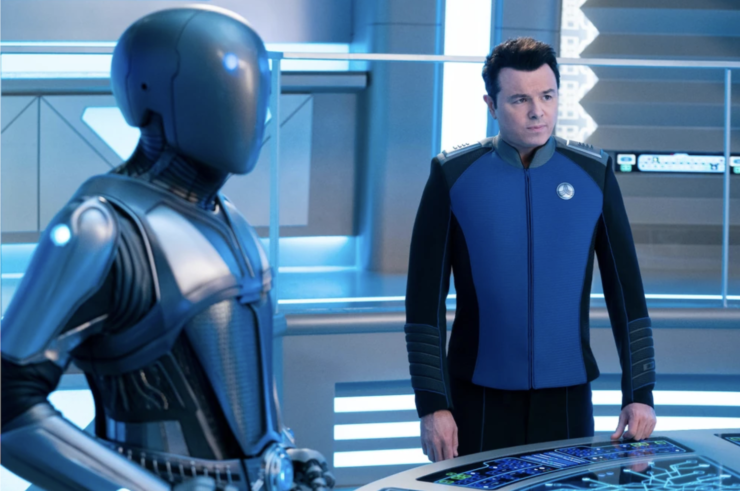These are the woes of Slaves;
They glare from the abyss;
They cry, from unknown graves,
“We are the Witnesses!”
—Henry Wadsworth Longfellow, “The Witnesses”
Villains don’t form in a vacuum. The bad guys have their reasons and, of course, they consider themselves the heroes of their own stories. The Klingons and Romulans were cool adversaries in original Trek; they became even more compelling when Next Gen fleshed out their worlds and gave personalities to their characters. You came to understand why they did what they did, even if you saw the kinks in their thinking; even if their acts were unconscionable. And, as a corollary, you began to realize that not every creature who pounded fist to chest and spoke in an aggressive, staccato tongue adhered to the same reasoning.
Very often, not completely without justification, Seth MacFarlane has been criticized for storytelling that appeals to the lowest common denominator. Family Guy was too reliant on sophomoric humor, non-sequitur tangents, and, in its early run, an abundance of Hitler jokes. Ted was a bro comedy where one bro was a stuffed bear. A Million Ways to Die in the West tried to bring Pythonesque historical deconstruction to the American frontier, but forgot to apply the academic rigor.
And The Orville has frequently been dismissed as the most expensive fan production ever mounted, Next Gen cosplay benefitting from the largesse of two generous networks. It’s easy to see why: It was well known that MacFarlane had been approaching Paramount with a plan to mount his own, very straight Trek series. When that fell through, he snagged some producers with Trek history, got Fox to pony up a budget, and launched his own show, one that was Next Gen in pretty much every aspect but name.
But anyone watching closely soon came to discover that The Orville was no hack job. Whatever you feel about MacFarlane, it’s become clear that his love for Trek—and especially Next Gen—was unironic. And where the official franchise was running on fumes by the time of Enterprise, MacFarlane brought a fresh vision to the concept, and an invigorating energy to the production. (And, frankly, a better approach to comic beats than anyone at Next Gen ever exhibited.)
Buy the Book


The City Inside
More than that, as his series grew beyond its initial over-reliance on yuks for yuks’ sake, fully embracing the space adventure nature of its inspiration, MacFarlane dared to tackle subjects that Next Gen’s producers would have blanched at. There were gray shades to the show’s morality; devastating sacrifices might accompany an episode’s resolution. The show’s Planetary Union didn’t have all the answers, and wins were rarely quite as clean as anyone would wish.
That was nowhere more clear than in the series’ recently concluded third—and possibly final—season, redubbed, rather pointlessly, The Orville: New Horizons. In it, Commander Ed Mercer (MacFarlane) would surrender the happiness of helmsman and close friend Gordon Malloy (Scott Grimes) in order to honor his responsibilities to the Union; and the Union in turn would give up a critical coalition rather than countenance an ally’s brutality toward its own people. MacFarlane being MacFarlane, his approach wasn’t always subtle—an episode about the Moclan child Topa’s (Imani Pullum) gender dysphoria approached the issue with all the nuance of an Afterschool Special. But Trek was never shy about swinging a sledgehammer on occasion, and MacFarlane’s willingness not to flinch from difficult issues—whether or not you agreed with his viewpoint—demonstrated that he was more than just a guy comfortable with dishing out fart jokes.
Which brings us to “From Unknown Graves” (2022), an episode where The Orville would consider the logic by which a once-oppressed species would rationalize universal genocide, and explore how that process might parallel the all-too-human predilection for prejudice.
The episode does not take the easy route in making the argument that the Kaylon—the androids that created Orville emissary (and eventual betrayer) Isaac (Mark Jackson)—might have considered themselves justified when they exterminated the unnamed alien race that had built them (although, mercifully, the episode doesn’t excuse the slaughter). The series had been setting up this central predicament throughout most of the third season, not only from the general threat the Kaylon continued to pose to organic life, but more specifically through the arc of Charly Burke (Anne Winters), an ensign who witnessed her friend’s sacrifice during the Kaylon invasion of Earth, and who cannot reconcile Isaac’s continued presence on the Orville because of it. She continually reminds the android that his redemption came at the heels of his original betrayal, and at one point only saves Isaac’s life because she is ordered to do so by Mercer.
Threaded throughout “From Unknown Graves” are flashbacks to a family on the Kaylon home world, showing how the “Builders” grew more callous and sadistic as their manufactured servants began to assert their autonomy. (A sequence where two children gleefully torture their android, K-1 (Graham Hamilton), with a pain-inflicting “obedience” device doesn’t quite justify the moment when the machine murders them in their sleep, but it gets close.) These sequences intersect with the arrival on the Orville of Timmis (Christopher Larkin), a Kaylon soldier salvaged from a wrecked ship by Pagosan scientist Villka (Eliza Taylor) and reprogramed to feel emotions. His eventual encounter with Charly, in which he explains to the ensign how the suffering inflicted upon his fellow androids ultimately resulted in their declaration of universal war, and how his newly instilled sensitivity to others has led him to realize how erroneous that declaration was, opens Charly’s eyes to her own closed-mindedness, and results in her rapprochement with Isaac.
Paralleling these stories are two others: In one, Dr. Claire Finn (Penny Johnson Jerald) convinces Isaac to receive Villka’s emotion implant, and then has to decide if bringing him closer to humanity is worth surrendering his memory and losing the android she’s come to know and love; in the other, Commander Kelly Grayson (Adrianne Palicki) play-acts captaincy of the Orville in order to win over the alliance of some virulently matriarchal aliens. (There’s also an additional storyline where Chief Engineering Officer John LaMarr (J. Lee) suffers compounding injuries during his trysts with the ultra-strong Chief Security Officer Talla Keyali (Jessica Szohr); it seems to exist only because once MacFarlane and crew had tossed B-, C-, D-, and E-stories into their narrative pot, they couldn’t resist throwing in an F-story, too. Ah well, at least Gordon doesn’t sing in this one.)
And if it seems there’s a surfeit of plotlines being crammed into one episode (it should be noted that with the extended runtime the series received after moving to Hulu, none of this feels rushed), they all eventually pull together to explore one idea: How the existence of empathy can conquer a tendency to prejudice.
The flashback sequences set the table: The Builders steadfastly refuse to acknowledge their creations’ growing sentience, leading to their brutal attempts to subjugate the androids. The emotionless Kaylon, in turn, logically extrapolate the cruelty of their masters to all organic intelligence and, once Isaac’s experiences on the Orville are downloaded to the Kaylon home world, determine that galactic extermination is the only solution. Charly, having undergone the horror of watching a friend and potential lover die, then turns the prejudice back on the Kaylon in general, and Isaac in particular. But then Timmis arrives, with his entreaty to Charly to understand, if not forgive. Her eyes opened, the ensign then finds within herself the capacity to accept Isaac for who he is, not what he once represented. (Right after threatening to punch him in the face.)
But surprisingly, none of these plotlines so clearly delineate the point “From Unknown Graves” is trying to make as what, at first glance, would seem be the episode’s second-most disposable storyline, next to John and Talla’s unfortunate love life. The Orville’s attempt to negotiate with the matriarchal Janisi is meant to be one of the episode’s two comic beats (along with the John and Talla stuff), although in practice that turns out to be just nominally so—high points include MacFarlane, or more likely his stunt double, doing an epic faceplant while toting around the Janisi contingent’s luggage, and Bortus (Peter Macon) deadpanning as the rest of the crew tries to figure out what to do with the hyper-masculine Moclan. Mercer and Grayson’s plan—to have the Orville’s female complement assume all areas of command while the males are busted down to subservient roles—is bad on its face, as even the two commanders finally admit, and leads to disaster once Janisi Captain Losha (Sophina Brown) declares her desire to take Mercer as her sex slave (the ever-zealous Gordon immediately volunteers to fill in).
But then, Grayson and Mercer approach Losha, telling her about how Grayson’s infidelity led to the dissolution of their marriage, and how, despite that, they continue to trust each other as professionals. Instead of a not-so-brilliant plan to try to subvert millennia of ingrained cultural prejudice, Mercer and Grayson address the individual before them, giving her insight into their own troubled past, and asking her to understand. And while Losha justifiably remains wary, their appeal—direct, honest, person-to-person—softens her judgement, and opens a path to further dialogue.
For all the overload of storylines crammed into “From Unknown Graves,” it turns out every one of them (well, most—sorry, John & Talla) work toward establishing a crucial theme as the season winds its way toward its finale: That empathy is never misplaced; that even a battle can be better fought when we understand why those who commit the worst atrocities have done so. Viewed from the vantage point of the full season, it’s a pivotal moment in the series, one that will pay off a couple of episodes down the line. But within its own context, “From Unknown Graves” delivers a vital message—driving home how, by endeavoring to understand all those we encounter, friend and foe, humanity can meet the challenges of a complex universe. By freeing itself from prejudice, society can rise to the ideals Gene Roddenberry advocated for half a century ago, and perhaps fulfill his dream.
* * *
I was never convinced that Seth MacFarlane was a Comedy God. Then again, I never regarded him as the Antichrist, either. That allowed me to approach The Orville with an open mind and—despite the show’s numerous stumbles—to be impressed with its willingness to tackle the complexities of being human. But you might think otherwise. If so, steer your cursor to the comments section below, and feel free to give your opinion—politely, though, and with friendship in your heart. A little empathy goes a long way.
Dan Persons has been knocking about the genre media beat for, oh, a good handful of years, now. He’s presently house critic for the radio show Hour of the Wolf on WBAI 99.5FM in New York, and previously was editor of Cinefantastique and Animefantastique, as well as producer of news updates for The Monster Channel. He is also founder of Anime Philadelphia, a program to encourage theatrical screenings of Japanese animation. And you should taste his One Alarm Chili! Wow!










